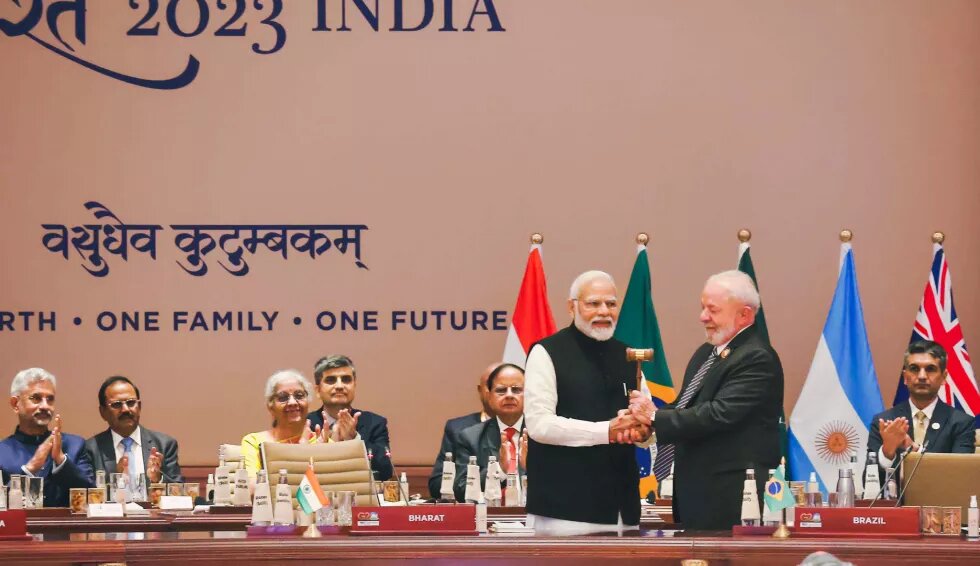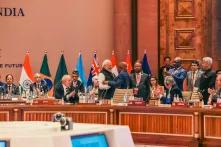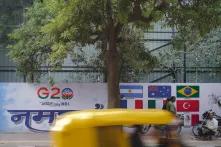Consecutive G20 presidencies – Indonesia, India and Brazil – indicate Global South’s expanding influence but it may bring in problems of diluting existing targets for global action at local levels.

Brazil will take over the Presidency of the G20 forum from India in November 2023. Indonesia held the Presidency in 2022. With Brazil in charge in 2024, three Global South countries will have held consecutive presidencies. The recent induction of the African Union as a full member during the New Delhi summit indicates a positive trend in G20's expansion towards the South in its shape, conduct, and remit. This trend's egalitarian nature is worth celebrating. However, the expansion brings certain risks that, if not addressed, may dilute G20's relevance and resilience in an increasingly uncertain world.
Leveraging a new context
Over the past decade, China's rise as a disruptive power has severely impacted the existing international order. Initially, China's aggressive territorial claims in the South China Sea raised concern in the region. However, it soon became apparent to the West that China's increasing influence among small and middle powers was a more significant threat. China achieved this by promoting an alternate international order, supplemented by lucrative economic mechanisms that several countries in the Global South needed. Governments from the Global South had been seeking reforms in global governance mechanisms, but progress on such reforms had been hard to come by, which made it easier for China to expand its influence. The West realised this and, therefore, saw the importance of respecting the agency of small and middle powers across the Global South. G20, which aims to make global governance systems more participative, was considered the forum to implement this policy.
Several Global South countries, such as India, are experiencing significant changes in their threat perception of China. With major conflicts along an unsettled border in the North and a growing Chinese presence in its immediate neighbourhood in South Asia and the Indian Ocean region, India's faith in rising together with China has diminished. Other countries, such as the Philippines, face the consequences of Chinese grey zone operations in their territorial waters. Furthermore, rising concerns regarding China's economic coercion, debt traps, and disregard of international norms have created bridge countries that share the West's concerns. These bridge countries see the West’s willingness to respect their agency as a leverage.
This was most evidently visible in Indonesia’s refusal to exclude President Putin from the G20 Summit in Bali, and the failure of the New Delhi declaration in naming Russia as an aggressor in the ongoing war between Russia and Ukraine. The leverage India enjoyed was such that the West prioritised having a watered-down declaration at the New Delhi Summit rather than focusing on criticising Russia. This shows that countries in the Global South are comfortable enough to pursue policies independent of the West in the space created by the West-China competition.
Agency to interpret
Expression of such agency has precedents in the Non-Aligned Movement during the Cold War. However, today’s context allows the Global South leverage like never before. Such leverage has allowed the Global South to reinterpret global agendas according to their capacities and priorities. This has been most evident in the conduct of the G20 presidencies and the expanding remit of this forum.
India and Indonesia expanded the G20 conduct and its remit by encouraging engagement with wider civil society – students, businesses, advocacy groups, etc. Both presidencies also witnessed the promotion of local culture to showcase indigenous knowledge, practices and historical community-based solutions. In the case of India, this push came from the top, with Prime Minister Narendra Modi instructing his sherpas to take G20 to all parts of India. As a result, more than 280 events took place outside India’s national capital. This bottom-up approach allowed domestic priorities to feature in the final declarations, and the focus groups India and Indonesia contributed to the G20 forum. Indonesia introduced auditors' meetings at the engagement group level, while India introduced an engagement group for start-ups.
Similarly, India and Indonesia focused on disaster risk reduction initiatives, reflecting another aspect of the bottom-up approach to their presidencies. Seeking reforms in the agents of global financial regimes that interact with countries of the Global South, Indonesia and India sought to highlight the need for reforms of multilateral development banks (MDBs).
Overall, both declarations had the common thread of inclusivity, i.e., making G20 more inclusive in its process of agenda setting, its interaction with existing global frameworks, and even membership, with the inclusion of the African Union. This indicates the ability of countries from the Global South – Indonesia and India – to interpret the shape, conduct and remit of the G20 forum based on their priorities.
A new narrative and risks
While this ability to interpret is good, there is a risk of diluting existing definitions that regulate global action on several issues. In addition, the leverage that countries from the South now enjoy can be used by them to pay lip service to global challenges while not taking concrete steps towards required action. A closer look at the Delhi declaration suggests that these risks could come to bear.
For instance, while the declaration said that global greenhouse gas emissions must be reduced to 43 per cent by 2030 compared to 2019, it avoided mentioning fossil fuel phase-out. The latter has been a sore point for countries in the Global South, whose economic growth stories continue to depend on fossil fuel use. India is the second largest coal consumer in the world and has traditionally preferred broad agreements on the phase-down of fossil fuels. India objected to the phrase phase-out and insisted on replacing it with phase-down at the COP26 summit in Glasgow. India’s objections to the phase-down of coal alone were witnessed again at the COP27 in Sharm el-Sheikh. Its preference for a broad agreement on phasing down all fossil fuels raised concerns in the West, as it could slowdown progress on the phase-down of coal-powered plants.
This is not to say that India or other countries from the Global South are not doing enough to combat climate change. However, these countries' interpretation of global goals based on their priorities can dilute such goals. Global South countries offer other ways to mitigate such challenges to compensate for this dilution. India is spearheading the International Solar Alliance to meet its ambitious target of 500 gigawatts (GW) of installed renewable energy by 2030. Similarly, India launched the Global Biofuel Alliance at the G20 Summit in New Delhi, indicating that India and others from the South are more than willing to carry their weight, if not on the same shoulders as the Global North wants.
Such readjustments can also be seen with India introducing concepts such as the Green Credit Programme (GCP) for its domestic market. India's argument rests on incentivising positive actions to combat climate change rather than framing such actions within a punitive framework. However, experts have warned that such a policy carries the risk of greewashing – companies and businesses spending more resources to cover up for their emissions rather than working actively to reduce their negative environmental impacts. Further, the GCP currently doesn't specify a standard unit of measurement. Businesses can accrue benefits based on activities ranging from afforestation drives to building sustainable infrastructure. Again, this takes focus away from global norms on why and how climate credits should work. Therefore, no matter the actual impact, such a policy helps India showcase its efforts on climate action.
Another reason why building new narratives is essential for Global South countries is their challenge in implementing effective domestic legislation for action on global challenges. An example is the regulation of internet-based technologies, data safety and privacy. While India spearheads internet-based services for delivering public goods equitably, concerns regarding weak domestic legislation on data privacy and safety continue to be a concern. The New Delhi G20 declaration mentioned the importance of "technological transformation and digital public infrastructure", “harnessing AI responsibly for good and for all", and "the importance of data free flow with trust and cross-border data flows while respecting applicable legal frameworks". But India’s Digital Personal Data Protection Act, 2023 (DPDP) leaves much to be desired.
India is promoting its India Stack within the Global South. This digital infrastructure component facilitates electronic transactions between various entities, such as government, businesses, and individuals, making it a valuable social and financial inclusion tool. The Stack has gained attention from governments in the Global South. India has signed MoUs with several nations, including Papua New Guinea, Trinidad and Tobago, Armenia, Sierra Leone and Suriname. Other countries, such as Nepal, Bangladesh and Singapore, have evinced interest in the Stack. However, India's record on data safety and privacy could be stronger. The DPDP prioritises economic incentives for India's growing tech start-up sector creating an ecosystem where such businesses can thrive. At the same time, its privacy, accountability and safety provisions must be improved compared to global best practices.
The need for better regulatory practices supported by necessary domestic legislation in the Global South will continue to grow across sectors. Yet, in an age where de-risking and reshoring of supply chains away from China, especially on new and emerging technologies, is a priority for Western powers, more space becomes available to the South to go slow on improving domestic legislation. Therefore, there is a risk that at the cost of cooperation from the Global South, the North may end up validating weak domestic legislation on important human-centric issues.
G20s future
During the New Delhi G20 Summit, Brazil’s President, Luiz Inacio Lula da Silva and the host for the 2024 G20 said that his priority would be on addressing inequality and democratising the forum, a theme consistent with India and Indonesia before him. Like Indonesia and India, Brazil will conduct the G20 by focusing on its priorities. An example is the Global Biofuel Alliance launched during the New Delhi summit, with Brazil being the second-largest producer of biofuel. Such priorities may or may not meet the necessary levels of action needed to combat critical issues such as climate change. Hence, G20 will continue to change in its shape, conduct and remit. Within this trend, Global South countries will continue interpreting global goals based on their priorities and, in the process, risk watering down the global agenda on some issues.


